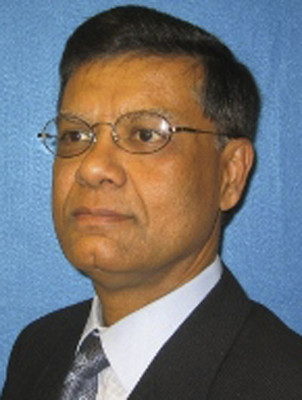Severity of stroke doubted
The stroke that had attorneys for Dr. Dipak Desai reporting to the Nevada Board of Medical Examiners in July that he couldn't recognize a wristwatch was actually minor, according to the prosecutor working with police investigating the physician and other medical personnel accused of putting Southern Nevadans at risk for hepatitis C and HIV.
Deputy District Attorney Scott Mitchell said a medical expert who recently examined the 58-year-old Desai's records for law enforcement did not find evidence of residual effects from the stroke that would make Desai unable to participate in his defense.
"When it comes to the wristwatch, I'd say that he might not have been able to recognize it one minute after the stroke; but an hour later that would have been different," Mitchell said.
Richard Wright, an attorney for Desai, declined comment.
In February, health authorities advised more than 50,000 patients at Desai's Shadow Lane clinic to undergo testing for hepatitis and HIV. Authorities investigating a cluster of hepatitis C cases had observed clinic nurses reusing syringes in a manner that contaminated vials of medication. They believe that led to patient infections.
The practice at the Endoscopy Center of Southern Nevada, according to city investigators, was done at the direction of Desai and other administrators.
Health officials have definitively linked nine hepatitis C cases to Desai's clinics, and an additional 105 cases have been characterized as "possibly linked."
After health care authorities announced almost a year ago the link between the hepatitis C outbreak and Desai's clinic, Mitchell had thought criminal charges could be filed in August.
He now hopes felony grand jury indictments for criminal medical negligence or battery with substantial bodily harm can be handed down in late February. But Mitchell said he "won't be surprised" if they're delayed until March or April.
Record searches are time consuming and there's still a reluctance among witnesses to come forward, Mitchell said.
Though unwilling to divulge why, Mitchell said he believes federal and state authorities, who meet regularly with local investigators, do not want to bring cases of billing fraud in connection with Desai's clinics until any local criminal prosecutions are over.
Federal and state authorities refuse to discuss their cases.
Still, Mitchell said he does not believe Desai's medical condition, which the doctor's attorneys cited in obtaining a delay in a scheduled September medical board disciplinary hearing, will be a factor in any prosecution.
"From what I know, he's back to normal," Mitchell said.
Desai suffered an earlier stroke in 2007. His lawyers in a malpractice case would later argue that he could testify only briefly because of the stress, despite the fact that he resumed performing surgery weeks earlier.
As the nearly year-old hepatitis C investigation unfolds, Mitchell said it becomes clearer that Desai was the man in charge.
"He made it his business to be very controlling. He was an autocrat."
Whether it was how best to save money on postage, drugs or surgical procedures, Mitchell said, Desai dictated behavior.
Other medical practitioners at Desai's clinics, he said, can give a defense that Desai can't -- that they were just following orders.
And other physicians not performing procedures in Desai's presence could argue that they were so busy looking at the monitor used, say, during a colonoscopy, that they did not see nurses reusing syringes.
"Desai is certainly a focus of the investigation, and we'll see where the evidence takes us with others," Mitchell said. "The others have some degree of deniability."
Mitchell said scanning computer records, particularly e-mails at Desai's clinics, takes "an inordinate amount of time." Investigators are looking for evidence of directives that practitioners should engage in cost-saving behavior that is medically unsafe, such as reusing syringes.
Mitchell also said investigators are searching for office records that would show, for instance, that too few syringes were ordered for the number of procedures undertaken.
Re-emphasizing what he told the Review-Journal in September, Mitchell said what continues to delay the investigation more than anything is the reluctance of witnesses to cooperate.
Doctors and nurses who worked with Desai could lose their medical licenses and their livelihoods if they admit they engaged in unsafe practices.
Police, who ordinarily take statements from witnesses, must often subpoena witnesses to give testimony under oath before a grand jury, which can be time consuming.
"We are still issuing subpoenas in the case," said Bill Cassell, a Las Vegas police spokesman.
Las Vegas police Capt. Al Salinas, who is working closely with Mitchell, has a financial analyst and two investigators working on the case.
On Wednesday, Salinas, who has said he had to pull his investigators off the case intermittently because of other pressing police business, deferred comment on the case to Cassell.
While the medical board has temporarily suspended the licenses of Desai, a hearing that could permanently revoke his license has been continued indefinitely.
Louis Ling, executive director of the board, said a status conference on Desai's case is scheduled for Feb. 17. At that time, he said, the hearing on his license could be scheduled.
Hearings on the licenses of two of Desai's colleagues, Dr. Eladio Carrera and Dr. Clifford Carrol, have been scheduled.
Carrera, whose license is temporarily suspended, is scheduled to have a hearing April 14. Carrol's hearing is set for June 22.
Contact reporter Paul Harasim at pharasim@reviewjournal.com or 702-387-2908.

















